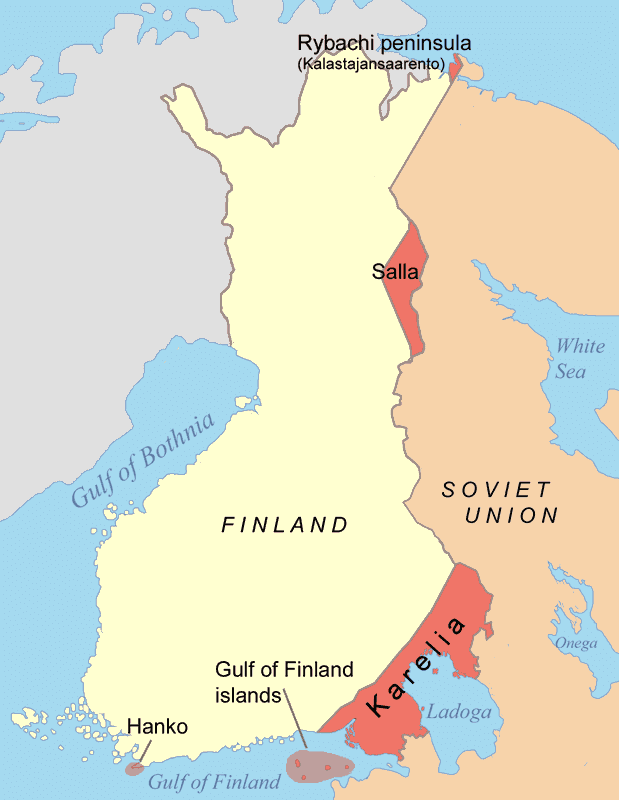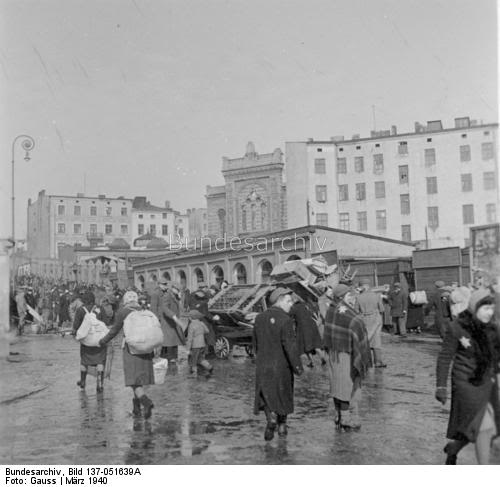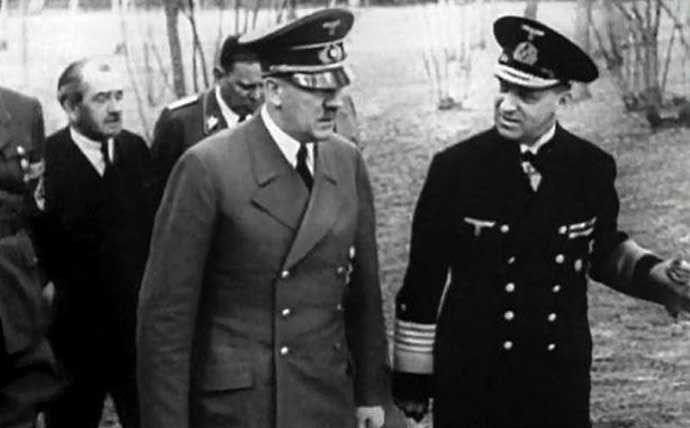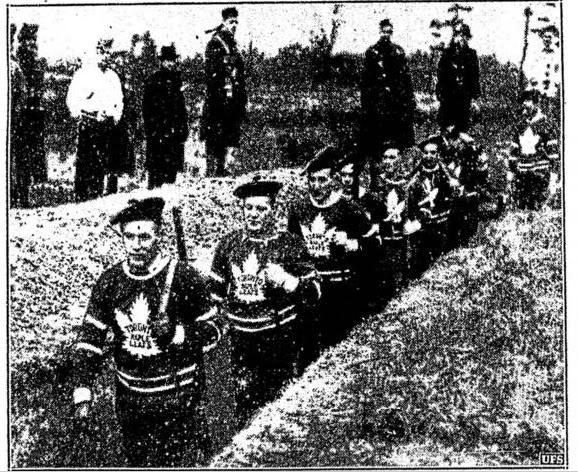Wednesday 13 March 1940
 |
| Finnish territorial concessions from the Winter War. |
Red Army signalman Anatoly Derevenets:
The entire earth started vibrating- all weapons on both sides. 2 days' ammunition spent in minutes.The final order of the day from Marshal Mannerheim:
Peace has been concluded between our country and the Soviet Union, an exacting peace which has ceded to Russia nearly every battlefield on which you have shed your blood on behalf of every thing we hold dear and sacred. You did not want war. You loved peace, work and progress; but you were forced into a struggle in which you have done great deeds, deeds that will shine for centuries in the pages of history.Estimated total losses from the 105-day Winter War (sources vary):
- Dead: 24,923 Finns, 200,000+/- Soviets
- Wounded: 45,557 Finns, unknown Soviets
- Tanks Lost: 3 Finns, 1600+- Soviets
- Planes Lost: 61 Finns, 750-900 Soviets
- Guns Lost: unknown Finns, 300+ Soviets
- Civilian Dead: 637 Finns, 0 Soviets
- Civilians Wounded: 1400 Finns, 0 Soviets
- Buildings destroyed: 4,500 Finns, 0 Soviets.
The subject of Soviet casualties has been the subject of wild guesses that often are influenced by the political environment of the moment - extremely typical in the USSR. Molotov, immediately after the war, gave an estimate of 200,000 Soviet killed and wounded. In the post-Stalin era, though, Nikita Khrushchev ratchets that figure up to 1,000,000 in his memoirs. The first figure appears low, the latter high - but nobody knows.
The war is a Soviet victory, but at a tremendous cost to its reputation. Its failure to overcome Finnish resistance despite massive numerical superiority in all areas of warfare betrays incompetence at all levels. This results partly from the Stalin purges of the 1930s, but also from unrealistic communist principles applied to the military, lack of proper training in all ranks and weaponry that is unsuited to the conditions faced and, in many cases, of mediocre quality for the era. Many Soviet soldiers of all ranks are disgusted at the casualties and the small gains attained.
Finnish Foreign Minister Väinö Tanner broadcasts news of the Armistice at 12:00. Later in the day, he also states that Finland is looking into the possibility of creating a defensive alliance with Norway and Sweden. Swedish Foreign Minister Guenther, Lord Halifax and Prime Minister Chamberlain all address their legislatures. The British troops on board ships for transport to Norway disembark.
While the pretext to send Allied troops to Norway has evaporated, the idea remains very much alive in the Supreme War Council. As First Lord of the Admiralty Winston Churchill, a notorious hawk, puts it in a letter to Foreign Minister Halifax:
Whether they [the Germans] have some positive plan of their own [for Norway]… I cannot tell. It would seem to me astonishing if they have not.Battle of the Atlantic: U-44 (Korvettenkapitän Ludwig Mathes), a successful boat with 8 merchant sinkings of 30,885 tons, hits a mine in Minefield No. 7 in the North Sea and sinks. All 47 crew perish. Date and cause are guesses, this may have occurred later from other causes.
German freighter La Coruna is scuttled by its crew when spotted by Royal Navy armed merchant cruiser Maloja south of Iceland.
Convoy OA 109 departs from Southend, Convoy OB 109 departs from Liverpool, Convoy OG 22F departs from Gibraltar, and Convoy HX 27 departs from Halifax.
German/Italian Relations: The two countries arrange for overland delivery of coal supplies to Italy, as supplies by sea have been disrupted by the Coal Ships Affair of previous days.
US Government: Undersecretary of State Sumner Welles leaves London for Rome.
The New York Herald Tribune publishes a scathing editorial castigating the United States Congress for not supporting the Finns when it mattered.
US Navy: The Fleet Marine Force concludes its Fleet Landing Exercise (FLEX) No. 6 at Culebra, Puerto Rico. The exercise is useful in developing techniques for rubber-boat landings and ship-to-shore communications.
Terrorism: An Indian nationalist assassinates Sir Michael O'Dwyer, the former governor of Punjab.
Holocaust: Hitler tells Colin Ross: "I'd welcome a positive solution to the Jewish question, but I haven't space for my own people."
Future History: Al Jarreau is born in Milwaukee, Wisconsin. He becomes a well-known jazz performer in the 1960s and thereafter.
 |
| Field Marshal Mannerheim. He always operates from a command train parked in an inconspicuous spot. His legendary status in Finland only grew during the war. |
March 1940
March 1, 1940: Soviet Breakthroughs Past ViipuriMarch 2, 1940: Soviets Swarm West in Finland
March 3, 1940: Soviets Across Gulf of Viipuri
March 4, 1940: USSR Apologizes to Sweden
March 5, 1940: Katyn Forest Massacre Approved
March 6, 1940: Finns Head to Moscow
March 7, 1940: The Coal Ships Affair
March 8, 1940: Peace Talks Begin in Moscow
March 9, 1940: Soviets Harden Peace Terms
March 10, 1940: Germany Draws Closer to Italy
March 11, 1940: Winter War Peace Terms Finalized
March 12, 1940: War is Over (If You Want It)
March 13, 1940: Winter War Ends
March 14, 1940: Evacuating Karelia
March 15, 1940: The Bletchley Bombe
March 16, 1940: First British Civilian Killed
March 17, 1940: Enter Dr. Todt
March 18, 1940: Mussolini To Join the War
March 19, 1940: Daladier Resigns
March 20, 1940: Soviets Occupy Hango Naval Base
March 21, 1940: Paul Reynaud Leads France
March 22, 1940: Night Fighters Arise!
March 24, 1940: French Consider Alternatives
March 25, 1940: Reynaud Proposes Action
March 26, 1940: C-46 First Flight
March 27, 1940: Himmler Authorizes Auschwitz Construction
March 28, 1940: Allies Ponder Invading Norway
March 29, 1940: Soviets Prefer Neutrality
March 30, 1940: Allied Uncertainty
March 31, 1940: The Tiger Cage
2019





